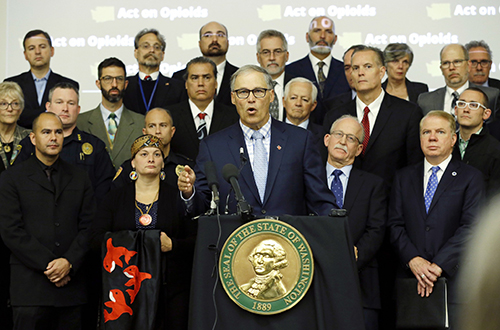The order calls for efforts to prevent overdose deaths, including expanding access to naloxone, a medication used to counter overdose effects.

Source: Peninsula Daily News
SEATTLE — Gov. Jay Inslee has issued an executive order to boost efforts to prevent and treat opioid abuse in the state.
Inslee ordered state agencies to work with local public health, tribal and other officials to prevent unnecessary prescribing of addictive painkillers and expand treatment for those addicted to opioids.
The order issued Friday calls for efforts to prevent overdose deaths, including expanding access to naloxone, a medication used to counter overdose effects.
Last year, 718 people died from opioid overdoses in Washington state, according to state officials.
More people die in accidental deaths from heroin and prescription painkiller overdoses than from vehicle or firearm-related deaths, they said. Prescription opioid drug deaths have gone down, but fatalities from heroin overdoses are rising, particularly among young people.
Inslee announced the executive order at a news conference at the University of Washington Medical Center in Seattle, where he was joined by medical providers, law enforcement officials, patients and family members who have been affected by opioid abuse.
“We all have an important role to play in the statewide movement to fight one of the most devastating crises facing our communities today: the public health crisis of opioids and heroin,” Inslee said in a prepared statement.
Inslee also called for using data to better detect misuse and monitor for overdose deaths. The Department of Health, working with others, will monitor prescribing practices to spot variations in how often painkillers are prescribed so that health providers and others can intervene.
“Opioid use disorder is a preventable and treatable chronic disease, much like diabetes or heart disease, and needs to be treated as such,” Secretary of Health John Wiesman said in a prepared statement.
The state agencies must submit a progress report by the end of the year.
